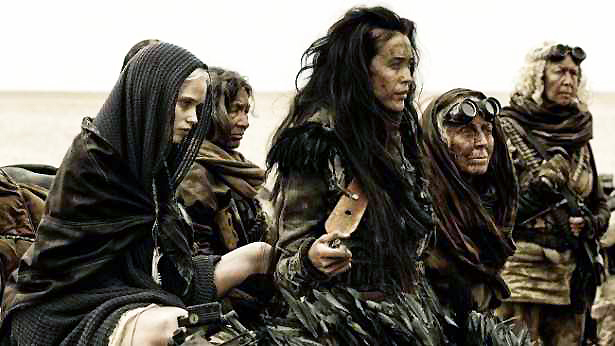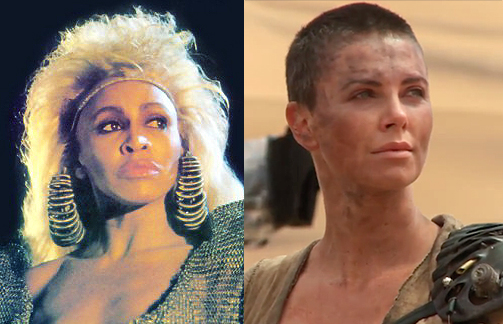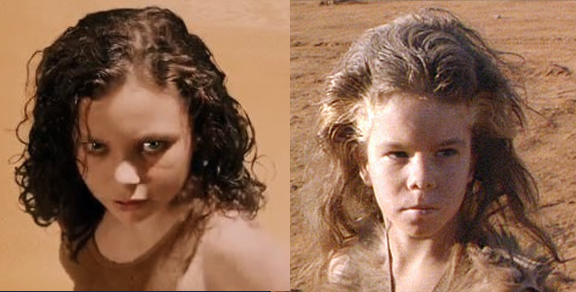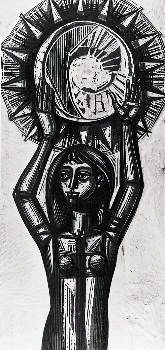The Middle Narrative: Ken Liu’s Grace of Kings
Sunday, July 19th, 2015by Calvin Johnson
I’m delighted to once again host my friend Calvin Johnson, who earlier gave us insights on Galactica/Caprica, Harry Potter, The Game of Thrones, Star Trek: Into Darkness and Interstellar. Additionally, this forms part of a series that discusses works of the contributors to The Other Half of the Sky. Links to other entries in the series appear at the end of each discussion.
———-
 Here is my Grand Theory of the Arts: humans are pattern-seekers extraordinaire, and the arts not only feed and feed upon that thirst for patterns, they also explore its limits. The visual arts, such as painting and sculpture, are not just about beauty or “accurate” representation but probe how in a few lines or a couple of dabs of paint we see images that cause us to rings with emotion. It’s true that much of recent and modern visual art challenges the casual viewer–but that’s the point. Just how abstract can a painting be and still “be” art?
Here is my Grand Theory of the Arts: humans are pattern-seekers extraordinaire, and the arts not only feed and feed upon that thirst for patterns, they also explore its limits. The visual arts, such as painting and sculpture, are not just about beauty or “accurate” representation but probe how in a few lines or a couple of dabs of paint we see images that cause us to rings with emotion. It’s true that much of recent and modern visual art challenges the casual viewer–but that’s the point. Just how abstract can a painting be and still “be” art?
While Jackson Pollack’s splatters of paint or Mark Rothko’s luminous squares of color can sell for millions of dollars (and they are art, for they ask of us difficult questions), it is harder in the written arts, poetry and fiction and essayism, to dance on the edge of randomness. Even writers who experiment with grammar and spelling and language do not completely abandon it; the burbling prose of Joyce’s Finnegan’s Wake, while not light reading, still drinks from the well of formal grammar. There is no serious literary equivalent of atonalism.
Macronarratives–plot and story–have more leeway. In traditional storytelling, the protagonist faces a challenge and either overcomes it or fails. Odysseus comes home. King Arthur’s dream of peace breaks apart. But as in the visual and auditory arts, traditional structures of narratives have been broken apart and reshaped. And though we are pattern seekers, and enjoy neat, tight stories of good folk winning and bad people being defeated, as far back as the book of Job people noticed the world doesn’t always work like that.
This tug of war exists even in the literature of the fantastic. That Ur-document of anglophone fantasy, Tolkien’s Lord of the Rings, depicts the battle between ultimate, depraved evil and noble and humble good. George R. R. Martin’s Song of Ice and Fire, a.k.a., Game of Thrones (and Brothels), takes the opposite tack. History is random, and petty resentments can shift the course of history as much as “good” and “evil.” Martin kills off his ersatz protagonists so frequently it’s not clear anyone will survive to the end. In fact, Martin is so intent on being the anti-Tolkien that his world is gritty and dark to an extreme degree. There is no sex in Tolkien, helped by the lack of women and boy’s boarding schools, but there is almost no consensual sex in Martin–the biggest exception being an incestuous relationship. (In a world with few economic opportunities for women, considering prostitution as “consensual” is problematic.)
Much as Martin rebelled against Tolkien, Ken Liu’s first novel, The Grace of Kings, strikes out against both Tolkien and Martin. Liu’s society, set on an isolated archipelago, eschews the Europhilia of Tolkien and Martin but also avoids the jury-rigged society of Jemisin’s Hundred Thousand Kingdoms series (which I wanted to like, but failed to). Liu’s carefully constructed society echoes China during the Warring States period, with echoes of Polynesian and Mesoamerican mythology and culture. The plot revolves around two friends who become rivals: one a minor criminal and trickster who nonetheless brims with empathy and compassion, the other the gigantic scion of a deposed family whose devotion to honor and bravery devolves into tyranny and slaughter. Both men struggle with the question of how best to govern and how best to deal with one’s opponents.
While two men are the central characters, women do play prominent roles in the novel. Liu’s society downgrades women–this is no social justice fantasy–but nonetheless they have agency beyond the victim-and-vengeance themes relegated to women by Martin (the tiny handful of prominent women in Tolkien are variants of the Virgin Mary; the exception of course is Eowyn, who is a different virgin, Joan of Arc sans hallucinations). While the sex is discreet, especially the few hints of non-heteronormitivity, it is mostly consensual and joyful. As all artists aspire to do, Liu for the most part manages to steer between the Scylla and Charybdis of those who wrote before him.
#
 Ken Liu had a couple of stories published in the early 2000s, but burst out in 2010, quickly snatching up Nebulas and Hugos and other awards almost as fast as he could e-mail out his quiet, introspective stories dealing with issues of displacement and generational conflict. In contrast, The Grace of Kings has little time for introspection. The narrative is nearly all narrative, and swiftly moving narrative at that, with barely any adornment. Tolkien’s characters are given to stilted speeches, while Martin believes in revealing character conflict through talky and often obscenity-strewn dialog. Liu frequently summarizes conversations and entire battles, and covers in a single if thick volume what would take his predecessors three. In his short stories Liu’s prose is spare, but they are not plot heavy, so the occasionally breakneck pace of events in the novel surprised and, frankly, disappointed me at first.
Ken Liu had a couple of stories published in the early 2000s, but burst out in 2010, quickly snatching up Nebulas and Hugos and other awards almost as fast as he could e-mail out his quiet, introspective stories dealing with issues of displacement and generational conflict. In contrast, The Grace of Kings has little time for introspection. The narrative is nearly all narrative, and swiftly moving narrative at that, with barely any adornment. Tolkien’s characters are given to stilted speeches, while Martin believes in revealing character conflict through talky and often obscenity-strewn dialog. Liu frequently summarizes conversations and entire battles, and covers in a single if thick volume what would take his predecessors three. In his short stories Liu’s prose is spare, but they are not plot heavy, so the occasionally breakneck pace of events in the novel surprised and, frankly, disappointed me at first.
But classical Chinese novels such as The Dream of Red Mansions and Journey to the West, which Liu explicitly referenced in his story “The Litigation Master and the Monkey King,” are meandering, picaresque tales whose plain (in translation, at least) prose and burlesque events veil their underlying confrontation with moral issues. In particular Sun Wukong, the Monkey King, is a trickster powerful enough to challenge Heaven and sentenced to serve a Buddhist missionary. As they travel from China to India over mountains and across rivers, Monkey bashes hordes of demons with his magic cudgel and wonders aloud why it is wrong to slaughter robbers–after all, it keeps them from coming back and bothering you again. With its rapid-fire plot and its own internal debates about what truly defines a monarch, The Grace of Kings follows in this tradition, and I suspect Liu owes as much to them as to his western predecessors.
In the same series:
The Hard Underbelly of the Future: Sue Lange’s Uncategorized
Shimmering Kaleidoscopes: Cat Rambo’s Near + Far
Ancestors Watch Over Her: Aliette de Bodard’s Space Operas






